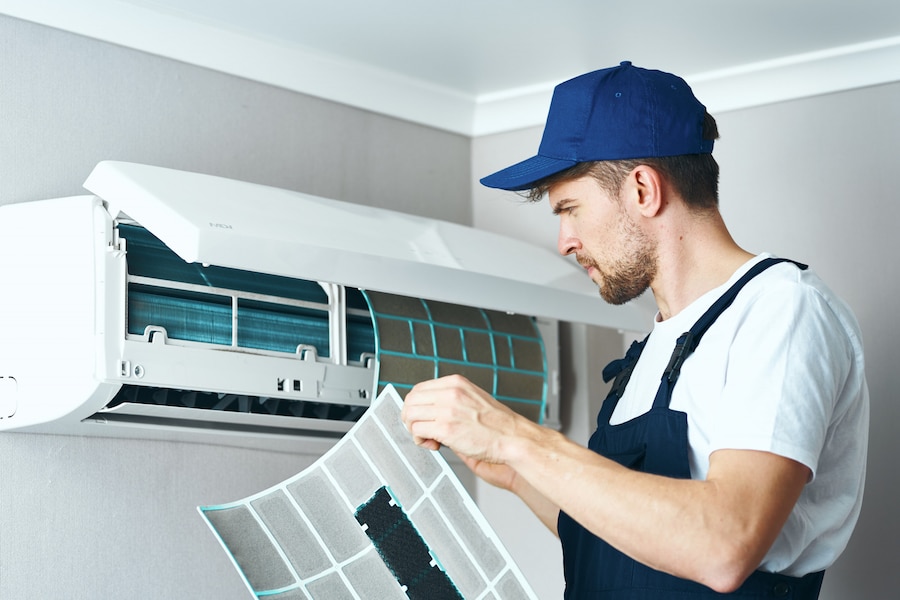Have you ever found yourself enjoying the comfort of your home, only to be interrupted by a sudden and unsettling sound coming from your air conditioner?
The once optimally functioning air conditioner is now producing loud noise, leaving you wondering “Why is my air conditioner making such loud noises?” Whether it’s the mysterious clatter of the compressor or the unsettling AC blower motor noise, air conditioner noise can be both perplexing and bothersome.
To know the causes behind these sounds and ways to tackle them, keep reading this blog.
Common Causes:
First and foremost, you must get into the source of the air conditioning sound problem to deal with it. Once you understand the causes, you can tackle it with precision. Thus, to make this cause identification process easier for you, we have compiled a list of common causes that lead to unusual noises from the air conditioner.
Loose or Damaged Parts:
The machinery of your air conditioner is a little complicated and comprises parts such as fan blades, compressors and motor mounts. All these parts work in harmony to deliver the desired cool air. However, when these parts become loose or suffer damage, they can wreak havoc on the system, generating disruptive noises, such as AC compressor noises or AC blower motor noise that echo through your space. These loose or damaged parts problems may seem like nothing initially, but they can compromise the overall functionality. To fix these issues, it’s essential to seek professional air conditioning repair in Brisbane or nearby.
Refrigerant Leaks:
Imagine your AC system as a delicate balance of pressure and temperature maintained by refrigerant circulation. However, leaks in this system can disturb the balance, resulting in noticeable hissing or gurgling noises. These sounds are a clear indication of inefficiency and require immediate attention. Ignoring refrigerant leaks can not only reduce your unit’s cooling efficiency but also lead to potential damage. Therefore, it is important to act quickly and have HVAC technicians locate and fix these leaks to keep your AC unit running smoothly so that you don’t have to worry about the AC refrigerant noises.
Dirty or Clogged Components:
Air filters and evaporator coils in your AC system work hard to keep the air clean, but they can get clogged with dust and debris over time. When this happens, airflow becomes restricted, putting strain on the system and causing rattling or buzzing noises. These noises clearly show that maintenance and replacement work is needed to ensure proper airflow and performance. By staying on top of regular upkeep, you can maintain a peaceful indoor environment and extend the life of your AC unit.
Electric Issues:
Even small problems with your air conditioner’s electrical system can lead to annoying AC unit humming or whining noises. Faulty wiring or capacitor malfunctions are common culprits that disrupt the system’s balance. Besides being bothersome, these electrical issues can also pose safety risks and cause further damage if ignored. That’s why it is crucial to rely on qualified professionals for electrical diagnostics and repairs. Whether you are in Brisbane or anywhere else, prioritising professional help ensures your AC system runs smoothly and safely for years to come so that you can stay away from the worry of ‘Why does my AC make whining noise?’
DIY Troubleshooting:
Now that we know the causes, let’s take a look at a few troubleshooting tips to handle these:
1. Cleaning or replacing filters:
One of the simplest and most effective DIY troubleshooting steps is to clean or replace your air conditioner’s filters regularly, as over time, filters can become clogged with dust and debris, obstructing airflow and reducing the efficiency of your unit.
2. Tigheting loose parts:
Another common issue that can contribute to loud AC noise is loose parts. Take a moment to inspect your unit for any loose screws, bolts, or fasteners, particularly around fan blades, compressor housing, and motor mounts. Using appropriate tools, tighten any loose parts to eliminate rattling or clanking noises and restore stability to your system.
3. Clearing debris around the unit:
Outdoor AC units are often susceptible to debris buildup, such as leaves, twigs, and dirt, especially during the fall and winter. Clearing debris from around the unit and ensuring adequate clearance can help maintain proper airflow and prevent fan obstruction.
4. Checking for leaks:
Refrigerant leaks are also one of the culprits that can not only lead to loud AC noises but also compromise the performance and efficiency of your unit. To tackle these leaks, check out for them and inspect the refrigerant lines and connections for any signs of oil stains or corrosion. Listen for hissing or gurgling sounds, which may indicate a refrigerant leak. If you suspect a leak, it is essential to call a professional HVAC technician for further diagnosis and repair.
When To Seek Professional Help?
When it comes to the health and functionality of your air conditioning system, seeking professional help is paramount. While some minor maintenance tasks can be handled independently, certain issues require the expertise of trained HVAC technicians.
1. Persistent noise: Persistent loud or unusual noises emanating from your air conditioner can indicate underlying mechanical issues that require professional attention.
2. Unusual Smells or Smoke: Unusual odours or visible signs of smoke coming from your air conditioner are clear indicators of potential problems that should not be ignored.
3. Frequent cycling: Frequent cycling of your air conditioning system can indicate inefficiencies or malfunctions that require professional attention.
4. Electrical problems: Electrical issues within your air conditioning system pose significant safety hazards and should be addressed by trained professionals.
Conclusion:
Understanding why your AC makes whining noises is crucial for maintaining a comfortable and efficient indoor environment. While some DIY loud AC troubleshooting steps can help address minor issues, persistent noise, unusual smells, frequent cycling, or electrical problems warrant the expertise of professional HVAC technicians.
Remember, when the noise becomes too much, it’s time to call in the professionals. Call us today at – 0428 149 923.

